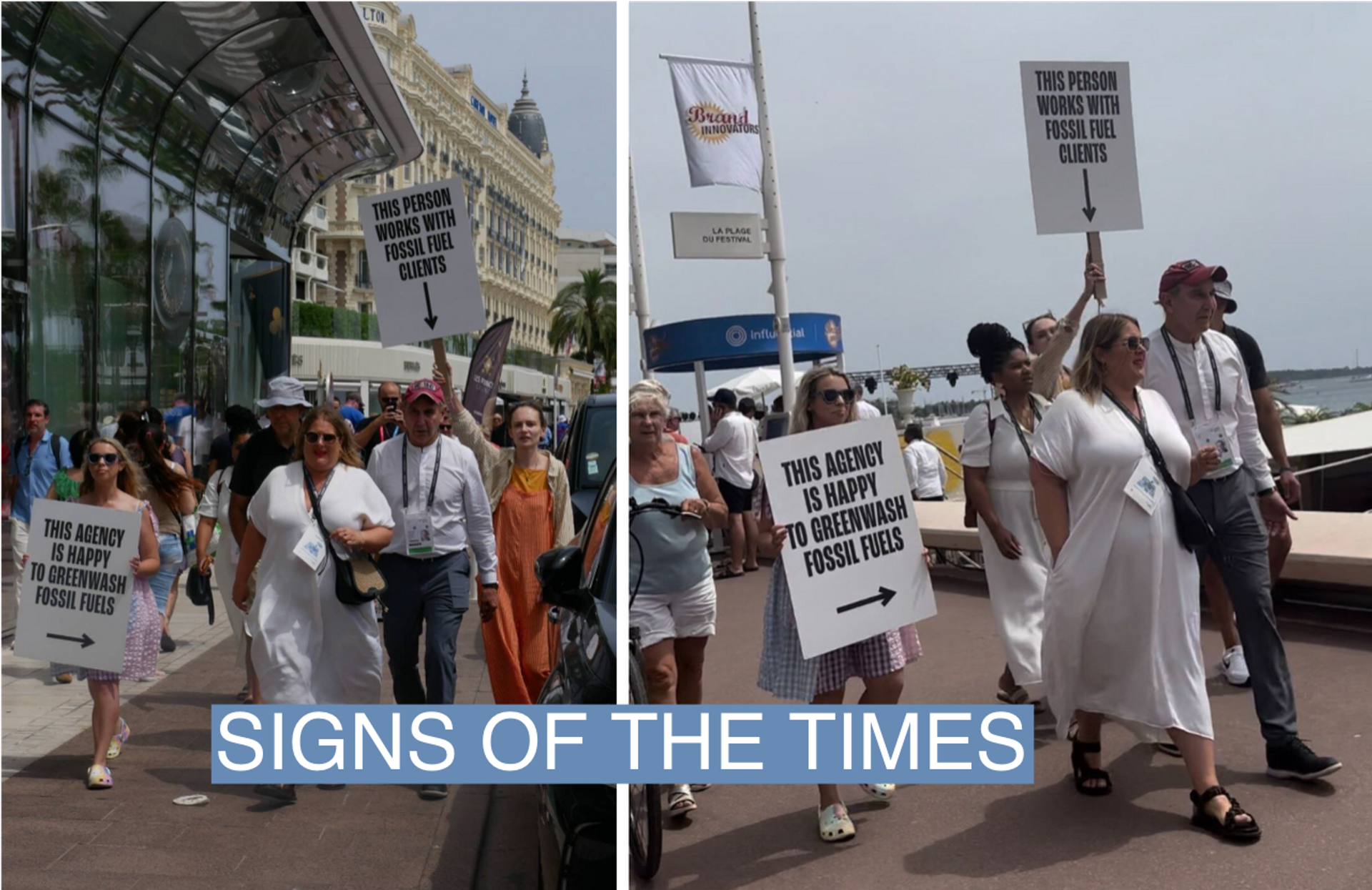The News
The Cannes Lions festival has so far passed without a high-profile public confrontation. A spokesman for Greenpeace, which stormed WPP beach last year, said the group isn’t focused on advertising this year. (The group is also still waiting for Cannes police to return their truck.)
But Clean Creatives, a nonprofit pushing the marketing industry away from fossil fuel clients, says it made progress on its industry pledge to reject oil contracts. This week, it announced its biggest signee yet, the Stagwell agency Gale.
Clean Creatives did deploy some aggressive tactics, strolling along the Croisette on Wednesday behind Edelman CEO Richard Edelman with a placard reading: “This person works with fossil fuel clients.”
(Edelman said in an email that he was walking to a panel on communicating about sustainability, and that “we work with companies committed to change.”)
Much of Clean Creatives’ campaign is less confrontational. An organizer with the group, Joe Cole, said a more optimistic sell appeals to the younger, progressive creative rank-and-file at advertising agencies. Those voices are probably the most effective pressure point.
“It’s a recruitment problem,” he said. “Gen Z cares about this stuff.”
The collective is particularly focused on Shell, which is reportedly leading its global media review, inviting agencies to pitch for its hundreds-of-millions of dollars of advertising budget.
It’s a sensitive subject. Earlier this month, Adweek barely got any response when it asked big firms about the contract. At a press briefing on Wednesday, Havas CEO Yannick Bolloré declined to discuss Shell, citing NDAs. (Some employees of Havas India who were discussing Shell before the press conference switched from English to another language when they noticed me nearby.)
Jules’s view
I was born, raised, and live on the French Riviera, a region whose prosperity has been tied for decades to superfluous industries and the highest-polluting individuals. Yachts, Formula 1, oligarchs — it’s all there, helping some of my friends and family to make a living.
That same scenic Mediterranean backdrop, however, is “a hotspot for highly interconnected climate risks,” the IPCC’s climate experts said in their latest report.
So I’m familiar with the irony at the core of this conversation, where leaders and workers of an industry whose main business model is to increase consumption say that they want to use their skillset to reduce it, or at least clean it up.
The clashes between Clean Creatives and the advertising industry are a byproduct of that tension, as various actors in the industry are radically disagreeing on where to draw a line in the sand and what is the most effective course of action. Many don’t want to draw a line at all.
And if a (very hypothetical) consensus on what is ethical or not is found, does it mean that advertisers are supposed to act as a counterforce and check the claims of their own clients? How is that supposed to work? One speaker invited by Clean Creatives in Cannes said outdoor gear brand Patagonia making Earth a primary shareholder “was a fantastic and innovative idea” — but earlier this month, Dutch investigative outlet Follow the Money reported the brand was sharing its factories with Zara and Primark.
“It’s complicated. I think it’s sort of a little outside of my paygrade,” Clean Creatives’ Duncan Meisel told me when I asked him how agencies could check their prospects or clients. He suggested topical experts could chime in.
“It’s super difficult. Even when you judge awards … Have you got enough information to be able to tell whether the submission is greenwashing?” said Sebastian Munden, the chair of Ad Net Zero, an industry group backing sustainability.
The View From The Ad Industry
Ad Net Zero, which was launched by trade associations for the British advertising industry and backed by the Big Six agencies, focuses on direct carbon emissions coming from advertising, from printing to powering servers. “Advertising’s influence on the wider world is a hugely important pillar of Ad Net Zero,” the group’s manifesto says.
“I’m a big fan of free speech,” said Munden, a former Unilever executive, of pressure groups’ more aggressive tactics. “In terms of the practical approach that we have, because we’re working at scale with the biggest players in the industry, we believe we will get to scale faster.”
Room for Disagreement
Clean Creatives has clashed with Ad Net Zero, and seized social media handles with the industry group’s name in February.
“You cannot effectively respond to the climate emergency while working for the people responsible for it,” the nonprofit tweeted from the @adnetzero account.
Notable
- U.K. ad industry leaders are disputing a study saying the sector is adding 32% to the carbon footprint of every person in the country.
- Extinction Rebellion protested in front of multiple ad agencies HQs in London earlier this month, calling them to give up on Shell.
